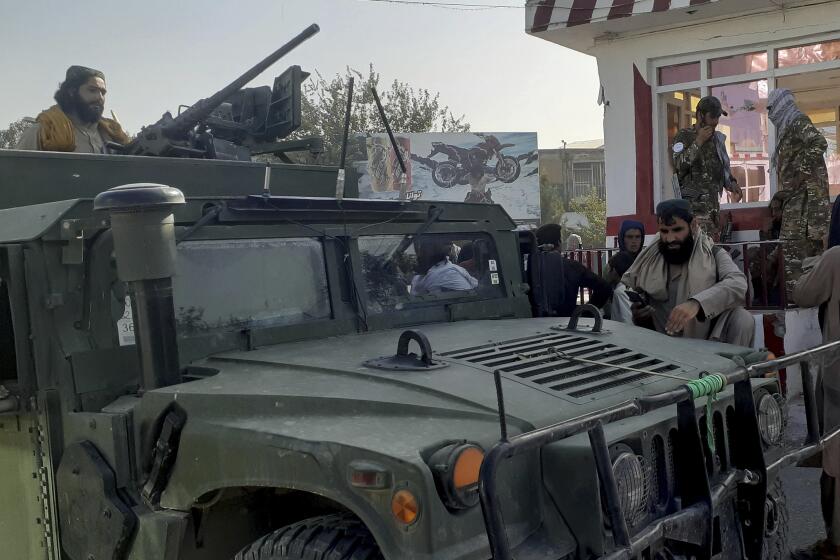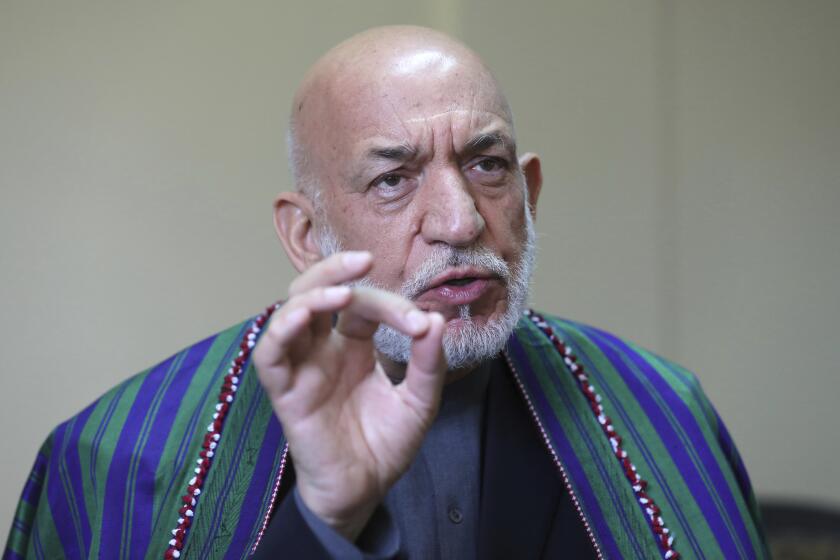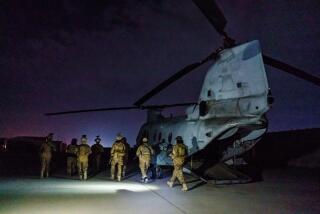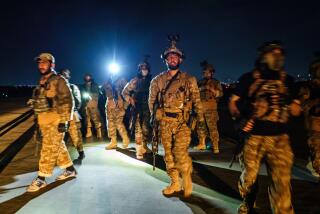U.S. vows to isolate Taliban if it takes over Afghanistan by force
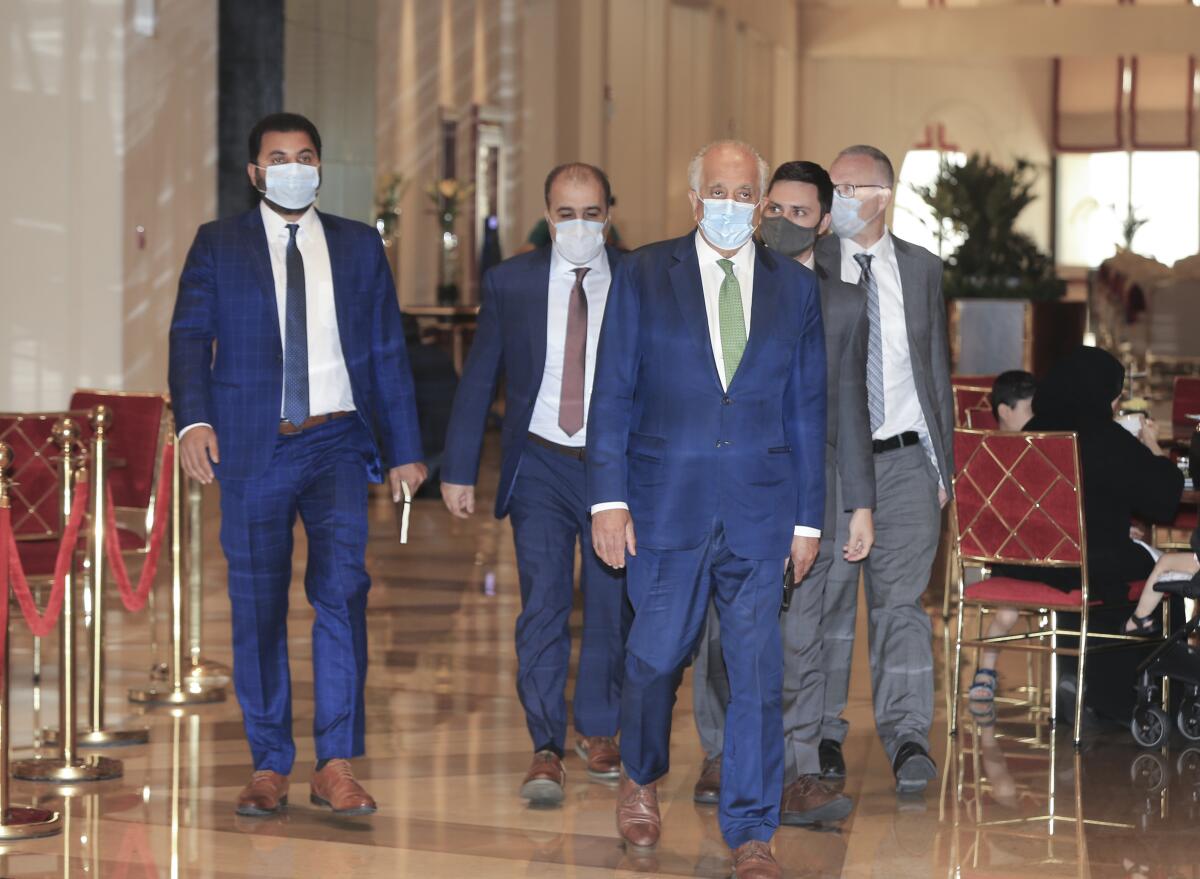
- Share via
KABUL, Afghanistan — A U.S. peace envoy brought a warning to the Taliban on Tuesday that any government that comes to power through force in Afghanistan won’t be recognized internationally, after a series of cities fell to the insurgent group in stunningly quick succession.
Zalmay Khalilzad traveled to Doha, Qatar, where the Taliban maintains a political office, to tell the group that there was no point in pursuing victory on the battlefield because a military takeover of Kabul would guarantee they would be global pariahs. He and others hope to persuade Taliban leaders to return to peace talks with the Afghan government as American and NATO forces finish their pullout from the country.
The insurgents have captured as many as six out of 34 provincial capitals in the country in less than a week, including Kunduz in Kunduz province — one of the country’s largest cities. On Sunday, they planted their flag in the main square, but government forces still controlled the strategic airport and an army base on the city’s outskirts.
They are now battling the Western-backed government for control of several others. Late on Tuesday, Taliban forces entered Farah and were seen in front to the provincial governor’s office.
Taliban spokesman Zabihullah Mujahed tweeted the insurgents had taken the city, which is the capital of a province with the same name. But Abdul Naser Farahi — a lawmaker from the area who is in Kabul — said the government still retained control of the intelligence department and a military base.
After a 20-year Western military mission and billions of dollars spent training and shoring up Afghan forces, many officials and observers are at a loss to explain why the government forces have collapsed, fleeing the battle sometimes by the hundreds. The fighting has fallen largely to small groups of elite forces and the Afghan air force.
The success of the Taliban blitz has added urgency to the need to restart the long-stalled talks that could end the fighting and move Afghanistan toward an inclusive interim administration. The insurgents have so far refused to return to the negotiating table.
Taliban fighters have seized several provincial capitals in recent days, marking a ‘deadlier and more destructive phase’ of the war in Afghanistan.
Khalilzad’s mission in Qatar is to “help formulate a joint international response to the rapidly deteriorating situation in Afghanistan,” according to the U.S. State Department.
He plans to “press the Taliban to stop their military offensive and to negotiate a political settlement, which is the only path to stability and development in Afghanistan,” the State Department said.
Meanwhile, the Taliban military chief released an audio message to his fighters Tuesday ordering them not to harm Afghan forces and government officials in the territories they conquer. The recording was shared on Twitter by the Taliban spokesman in Doha, Mohammad Naim.
In the nearly five-minute audio, Mohammad Yaqoob, the son of late Taliban leader Mullah Mohammad Omar, also told the insurgents to stay out of abandoned homes of government and security officials who have fled, to leave marketplaces open and to protect places of business, including banks.
It was not immediately clear if Taliban fighters on the ground would heed Yaqoob’s instructions. There have been reports by civilians who have fled Taliban advances of heavy-handed treatment by the insurgents — schools being burned down and repressive restrictions imposed on women. The office of the United Nations human rights chief said it has received reports of summary executions and military use and destruction of homes, schools and clinics in captured areas.
As the U.S. hastens to exit Afghanistan by Aug. 31, women fear a potential return to power by the Taliban and its harsh view of their role in society.
There have also been reports of revenge killings in areas where the Taliban has gained control. The insurgents claimed responsibility for killing a comedian in southern Kandahar, assassinating the government’s media chief in Kabul and a bombing that targeted acting Defense Minister Bismillah Khan Mohammadi, an attack that killed eight people. The minister was not harmed in the attack.
The intensifying war has driven thousands of people to Kabul, and many are living in parks without adequate access to water and other necessities in the summer heat. The fighting has also increased the number of civilian casualties.
The U.N. human rights chief, Michelle Bachelet, said Tuesday that her office had counted at least 183 deaths and hundreds of injuries among civilians in a handful of cities in recent weeks. She cautioned that “the real figures will be much higher.”
The International Committee of the Red Cross said that its staff had treated more than 4,000 Afghans this month in its 15 facilities across the country, including in Helmand and Kandahar, where Afghan and U.S. airstrikes are trying to blunt the Taliban onslaught.
Afghanistan’s former president said the United States came to his country to fight extremism and bring stability and was leaving having failed at both.
“We are seeing homes destroyed, medical staff and patients put at tremendous risk, and hospitals, electricity and water infrastructure damaged,” Eloi Fillion, ICRC’s head of delegation in Afghanistan, said in a statement.
“The use of explosive weaponry in cities is having an indiscriminate impact on the population,” Fillion added. “Many families have no option but to flee in search of a safer place. This must stop.”
The lightning speed at which the Taliban has made battlefield gains has lent urgency to the need to restart talks. The surge began in April, when the U.S. and NATO announced that they would end their military presence and bring the last of their troops home. The final date of the withdrawal is Aug. 31, but the U.S. Central Command has said the pullout is already 95% complete.
On Monday, the U.S. emphasized that the Biden administration now sees the fight as one for Afghan political and military leaders to win or lose.
Start your day right
Sign up for Essential California for the L.A. Times biggest news, features and recommendations in your inbox six days a week.
You may occasionally receive promotional content from the Los Angeles Times.
“When we look back, it’s going to come down to leadership and what leadership was demonstrated, or not” by Afghans, Pentagon spokesman John Kirby said at a Pentagon news conference. “It’s their country to defend now. It’s their struggle.”
Khalilzad, the architect of the peace deal the Trump administration brokered with the Taliban, was expected to hold talks with key players as well as with “multilateral organizations” to see how to restart talks and halt the Taliban onslaught.
The U.S. envoy will also probably seek a commitment from Afghanistan’s neighbors and the region not to recognize a Taliban government that comes to power by force. When the Taliban last ruled Afghanistan, only three countries recognized its rule: Pakistan, Saudi Arabia and the United Arab Emirates.
Senior Afghan officials may travel to Doha in the coming days, including Abdullah Abdullah, who heads the government’s reconciliation council. Pakistan’s national security advisor, Moeed Yusuf, called Monday for “reinvigorated” efforts to get all sides in the conflict back to talks, describing a protracted war in Afghanistan as a “nightmare scenario” for Pakistan.
Yusuf, speaking to foreign journalists in Islamabad, refused to say categorically whether Pakistan, which holds considerable sway over the Taliban, would recognize a Taliban government installed by force, saying instead that Pakistan wants to see an “inclusive” government in Kabul.
More to Read
Sign up for Essential California
The most important California stories and recommendations in your inbox every morning.
You may occasionally receive promotional content from the Los Angeles Times.
